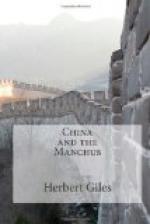“To all friendly nations,—Greeting. Hitherto irremediable suppression of the individual qualities and the national aspirations of the people having arrested the intellectual, moral, and material development of China, the aid of revolution was invoked to extirpate the primary cause. We now proclaim the consequent overthrow of the despotic sway of the Manchu dynasty, and the establishment of a republic. The substitution of a republic for a monarchy is not the fruit of transient passion, but the natural outcome of a long-cherished desire for freedom, contentment, and advancement. We Chinese people, peaceful and law-abiding, have not waged war except in self-defence. We have borne our grievance for two hundred and sixty-seven years with patience and forbearance. We have endeavoured by peaceful means to redress our wrongs, secure liberty, and ensure progress; but we failed. Oppressed beyond human endurance, we deemed it our inalienable right, as well as a sacred duty, to appeal to arms to deliver ourselves and our posterity from the yoke to which we have for so long been subjected. For the first time in history an inglorious bondage is transformed into inspiring freedom. The policy of the Manchus has been one of unequivocal seclusion and unyielding tyranny. Beneath it we have bitterly suffered. Now we submit to the free peoples of the world the reasons justifying the revolution and the inauguration of the present government. Prior to the usurpation of the throne by the Manchus the land was open to foreign intercourse, and religious tolerance existed, as is shown by the writings of Marco Polo and the inscription on the Nestorian tablet at Hsi-an Fu. Dominated by ignorance and selfishness, the Manchus closed the land to the outer world, and plunged the Chinese into a state of benighted mentality calculated to operate inversely to their natural talents, thus committing a crime against humanity and the civilized nations which it is almost impossible to extirpate. Actuated by a desire for the perpetual subjugation of the Chinese, and a vicious craving for aggrandizement and wealth, the Manchus have governed the country to the lasting injury and detriment of the people, creating privileges and monopolies, erecting about themselves barriers of exclusion, national custom, and personal conduct, which have been rigorously maintained for centuries. They have levied irregular and hurtful taxes without the consent of the people, and have restricted foreign trade to treaty ports. They have placed the likin embargo on merchandise, obstructed internal commerce, retarded the creation of industrial enterprises, rendered impossible the development of natural resources, denied a regular system of impartial administration of justice, and inflicted cruel punishment on persons charged with offences, whether innocent or guilty. They have connived at official corruption, sold offices to the highest bidder, subordinated merit to influence, rejected




